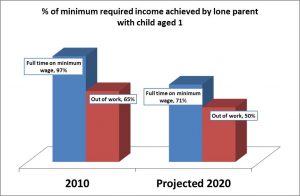The present government has rightly drawn attention to the fact that people will be at lower risk of poverty if they work, have two parents and do not have many children. However, the translation of these realities into “behaviourist” policies – incentives to conform to certain family norms – started out more tentatively than one might have expected under the previous, Conservative-led coalition. The married tax allowance was slow to arrive and tiny when it came. Iain Duncan Smith originally launched his flagship Universal Credit emphasising how it could make low-income working families better off, not punishing them with cuts. Even the benefit cap, while mainly hitting people living in large families or expensive areas, was sold mainly as a way of being fair to taxpayers in hard times rather than punishing people for having more children.
The July Budget decisively buried any such hesitancy. It withdrew means-tested support for third and subsequent children, born after 2017. More broadly, by increasing minimum wages for under-25s and cutting benefit support, in and out of work, in a range of ways, it recalibrated the incomes of the worst off families in this country.
In new projections for 2020, I show how gains and losses will be very different by family type. The biggest losers will be those not working and those in larger families. The results also paint a grim picture for lone parents, who will lose badly even if they work full time , since one person working at the enhanced “National Living Wage” (NLW) rate is not nearly enough to compensate for cuts in working benefits. In contrast to the previous emphasis on helping lone parents benefit from work, the Budget sharply cut the amount that they can earn before losing Universal Credit.
In contrast, families with two parents in full time work on the NLW will typically become better off. However, this is an unusual working arrangement: only 6 per cent of those on low incomes have two full time workers. Overall most families will lose out.
Stepping back from the detail of these calculations, two big themes emerge. Firstly, the changes ahead will create not just some carrots for “doing the right thing”, but many sticks for those whose life situation creates additional needs. The penalty you will face will be greater in 2020 than now if your partner leaves you, if you have three children and then later lose your job or if your zero-hours contract or lack of suitable childcare prevent you from working full-time. For many families, no “behavioural” incentive will alter these life situations.
Secondly, my calculations show that over the course of the present decade, the consequence of cuts for some low income families will be not merely to make them struggle a bit more, but rather to change fundamentally their standard of living. I show this by comparing living standards in 2010 and 2020, expressed as how far families fall below the minimum income standard – a level that members of the public think is adequate. Here is a frightening example of how much worse off some families will become:
At the beginning of the decade, the tax credit system helped a low-paid lone parent earn about what she needed for her family to reach an adequate living standard. By the end of the decade, even with the enhanced NLW, a comparable lone parent will have nearly 30 per cent less in her purse than she needs to support herself and her child – producing a dramatic fall in her standard of living, nearly to the level of an out-of-work family in 2010. The work incentive will nevertheless be preserved, by a reduction in the out-of-work income to only half what is needed. Such policies are creating more sticks than carrots, making people worse off if they do not have a partner or a full time job – whether or not this is the consequence of a voluntary choice.

